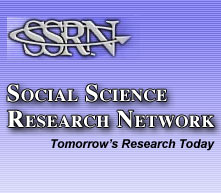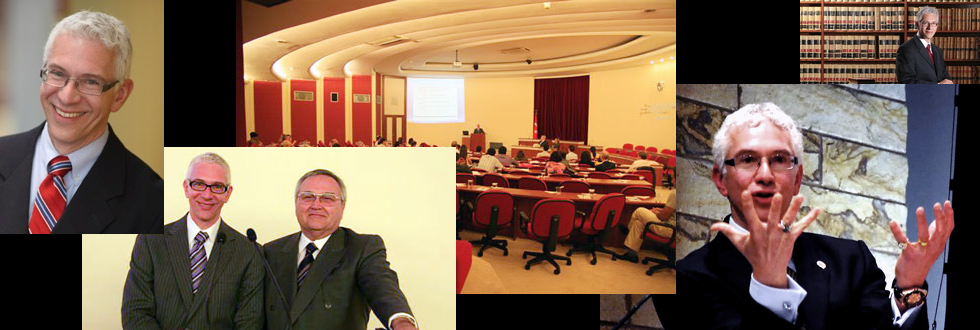A brief narrative accounting. . . .
To give an account of my career puts in mind an ancient, and now modern trial of the psychostasia—the weighing of souls—a practice as old as Osiris and the Greeks, as culturally embedded in the West in St. Michael separating the just form the damned, and in Marxist Leninist China in the performance of criticism and self-criticism among Communist Party cadres. But it is as deeply inscribed in the evaluative methodologies of Western institution. To give an account, then, requires me to perform my own judgment of myself, but in a way that is meant to show me in the best possible light. As I am judging so will I be judged (the purpose of this narrative)—and to the same ends as judgment has been sought and rendered for thousands of years. Yet, unable to wholly anticipate the structuring premises on which this judgment will be grounded, I judge myself first for myself, and so judging, perhaps also judge the judge. And more profoundly than the aggregation of harvested data accumulated over a professional lifetime that follows, a professional life lived in the pursuit of understanding for its own sake rather than for the greater glory of the seeker, this paragraph suggests the character of the object of the accounting that follows. And so I hold myself to account.
Who am I? Sorry, nothing excruciatingly personal here. The object is not personal growth through confession, but to reveal the pathways I have taken to knowledge through discussion and publication in a career marked by a freedom to follow my muses. That also essentially describes the structure of this narrative of my career—the willingness to follow where insight leads. With hopes that the reader thus finds this useful, the narrative begins.
I started life in Cuba. I moved with many other people to Miami after the Cuban Revolution of 1959. I grew up in Miami and started traveling when I left for college in Massachusetts. Miami was an interesting city at the time, a city of transients and migrants. Transients fed the local seasonal tourist industry, its vices and virtues. Transients included the visitors themselves, well known for finding in the city a place where they could be other than themselves (I still recall how differently Northern visitors acted in their own home towns than they had in Miami). Migrants drifted down from the same places as the tourists, at the time mostly people seeking something new in retirement, clustered along the waterways; migrants from the deeper South scattered elsewhere. And then there were the migrants from the Caribbean. We were in a sense a world apart. Exotic even among the exotics who now called Miami home. Everyone was always both settled and a stranger. That set a foundation, a frame of reference, that has informed most of my work since. The move from Miami to Massachusetts was quite a culture shock, really. Boston was not a city of transients, but one of waves of immigrants that had layered themselves within the economic, social and political life of the state, and ossified in ways that appeared both galling and satisfying to them all. New York, where I completed my formal education, provided a more dynamic variant of this layering. I got over the shock but the differences fueled my curiosity about difference, acculturation and the dynamics of relationships in a society that appeared to function quite distinctly in different places and with different mixes of communal groups—self-sorted and otherwise. And I like to laugh.
Since graduation, I have lived all over this country-Massachusetts, New York, California, Oklahoma, and now Pennsylvania. I have lived in large cities and very small villages. I have spent significant time abroad as well. I tend to view everything as potential original source research material. Nothing is uninteresting-from reality television in Spain to game shows in China, from great social and political movements, to religious revivals. Everything is connected in some way.
Perhaps who I am can best be understood as proceeding from a view that all categories are artificial to some extent, meant to protect those who maintain the divisions as much as to explain the way things “work” or are “ordered.” Growing up both inside and outside of things made it easier to understand the mechanics of fitting in and provided some freedom in checking out. So, in a nod to the way we get to know people through a standard set of categorizations, I think that “who am I?” can be most effectively reduced to a conventional career trajectory structure:(1) where I have worked; (2) what I teach; (3) what I write about; (4) what professional activities I engage in; and (5) how else I enjoy the world.
My initial career trajectory was fairly conventional—in the way that immigrant children believe is important for gaining a sense of belonging and accomplishment in an adopted culture. I clerked for a federal appellate court judge (Hon. Leonard I Garth (Third Circuit New Jersey)), one of the most formative experiences of my life in close quarters with a great man and an even better judge. I then moved into law practice in Los Angeles. For nearly a decade I practiced around business related issues of all kinds. More importantly, I absorbed the culture of law service delivery—the way in which jurisprudence is incarnated in the everyday decisions of individuals and in the strategic choices of their lawyers. Absorbing the cultures of the bar and the bench, the culture of law in the world, was intoxicating but also alienating.
Business is no place to become self-aware, especially about business. And it is here that my career path begins its fairly unconventional journey. Most individuals transition to the academy after a few years “in the world”—and now increasingly after the securing of an advanced degree beyond the J.D.—I transitioned late for my cohort. But that, as well, and in retrospect added another component to my perspective, and soon, my academic work. I started at the University of Tulsa College of Law, which was then a dynamic institution seeking to embed itself more directly in the academic conversations emerging internationally. I taught combinations of civil procedure, corporations and constitutional law. That odd collection produced an interesting set of connections that have also grounded my thinking—the interconnectivity of institutions, and their methods of communication (internally and externally). That focus on institutional formation, self-consciousness, and communication then guided course choices in the years after—European Union law (during a happier and more positively dynamic period in its history), comparative law, the law of religion, and individual rights. Eventually I joined, and then led, the law school’s International and Comparative Center—creating and operating programs in Europe and Latin America.
I now teach at the Pennsylvania State University, first in its Dickinson School of Law in Carlisle, and since its founding at the University’s main campus law school (Penn State Law) in the mountains of central Pennsylvania. I hold academic appointments in the Law School and School of International Affairs (the latter I helped organize). I also direct the Coalition for Peace & Ethics, a non-governmental organization focusing on governance issues. I have participated in conferences, given short courses, and seminars all over the world, China, Belgium, Italy, Canada, France, Switzerland, Slovakia, Lithuania, Germany, Denmark, Turkey, the U.K., Ireland, Brazil, Argentina, India, Hong Kong, South Africa, and Spain.
Curiosity permitted me the flexibility to explore a large number of courses that I teach and have taught over the years. In the constitutional law area I have taught the basic constitutional law course (the law of government and individual rights), seminars on individual rights, comparative constitutional law and the constitutional law of religion (for which I co-authored a casebook). In the business law field I have taught the basic corporations course, as well as international business transactions, comparative corporate law (for which I authored a casebook), and the law of multinational corporations. In the comparative and foreign law fields I have taught both the constitutional and substantive law of the European Union, and the basic comparative law course. I have taught a foundational course on the law and legal systems of the U.S. (for which I am now finishing a casebook). I also teach an introduction to the legal framework of international organizations (Actors, Institutions, and Legal Frameworks in International Affairs) in the School of International Affairs.
The courses are not unrelated, and each has been helpful in framing the structures of my analysis. Each of the courses suggest an ideology that produces coherence and the analytical framework within which it is possible to make sense of “things”—conflicts, expectations, and the inferences from custom, tradition and expectations of the normal. Each of these areas also posit one or more forms of institutional machinery through which the ideological framework can be expressed and managed. Those institutions also produce their own normative consciousness. These norms are to some extent trans-cultural, but they are also quite similar among institutions within a culture—the state, the corporation, the incarnation of religion within institutions, the institution of societal organs (civil society) all operate in similar ways, though under quite different jurisdictional and operational frameworks. Exploring these connections is intoxicating and informs both my teaching and research.
My engagement is sometimes noticed by others. I have received a number of unit and university teaching awards—the latter at the University of Tulsa. I mention them as a necessary sign of acknowledgement by others, though I also recall William Geddis diatribe (Agapē agape (Viking 2002)) about awards and their dangers. Teaching requires as much a commitment to the effective dissemination of knowledge as it touches on the organization of knowledge. One must empower the student to learn for herself, but one must actively engage in that empowering by guiding the student to the understanding of the frames of conventional premises about the knowledge conveyed (“Democratizing the Global Business and Human Rights Project by Catalyzing Strategic Litigation From the Bottom Up,” in Human Rights and Business: Moving Forward, Looking Back 254-287 (Jena Martin and Karen Erica Bravo, eds., Cambridge University Press, 2015)) (With Keren Wang, Nabih Haddad and Tomonori Teraoka)). I was selected as a Penn State Schreyer Honors College Distinguished Honors Faculty for the 2014-2015 academic year.
My research naturally follows. I engage in the study of power/law frameworks from both its process aspects (the development of a mechanics of rulemaking, enforcement, interpretation and the like), and their substantive aspects (generally the ideologies that produce and sustain the morals and ethics frameworks inscribed in law). This appears to take me in a lot of different directions, but actually keeps me focused on the institutional governance regimes that may produce rule systems.
This work has been recognized directly or indirectly in a number of ways. I have been elected to the American Law Institute. I have served on the national advisory council of the Second National People of Color Scholarship Conference, and the National Steering Committee and Finance Committee of the Third National People of Color Conference. And like many of my peers serve on a number of editorial board for academic journals, the most recent appointment being to the editorial board of Cambridge University Press’ Business and Human Rights Journal.
The focus of this research is on globalization broadly understood in its institutional and constitutional context. Much of that work centers on governance and human rights. By governance I mean law and non-law systems of managing behavior. By human rights I mean fundamental rights to which individuals are entitled in their relations to each other, to the state and to other aggregations of governance power, not merely the formal construct deriving from the constitutional traditions of states and the hard and soft law products of international law, but also the governance frameworks of corporations and other actors that significantly affect human behavior in ways we have come to understand are infused with notions of human rights. Governance and human rights, whether derived from the practices and authority of states or non-state actors, are now increasingly at the center of globalization, which can be understood to include transnational law and governance regimes, rule systems (constitutional, religious, and corporate) created by states and non-state organizations, and the interactions among them. I am also interested in the ordering of systems through institutions–states, religions, and corporations–the disorderliness, and collisions of these systems. Of particular interest lately: the relationship between non-Western states (particularly states with foundations in Marxist Leninist theory, e.g. China and Cuba) and globalization, including transnational corporate social responsibility, transparency and governance, sovereign wealth funds.
With respect to numbers, I can summarize my research production conventionally. I have authored over one hundred journal articles that have appeared in the most prestigious to the humblest journals. Most are single author works, but not all. I have also authored a little over twenty contributions to collections of essays in published collections. Many are published through Cambridge University Press. Others are published with Routledge, Carolina Academic Press and others. Most are single author works. I have edited two such collections myself, one with my very esteemed colleague Jan Broekman. I have authored three books, two of which are casebooks. One is single authored (Comparative Corporate Law); the others are co-authored with Jan Broekman (Signs in Law) and Frank Ravitch (Law and Religion). I will be publishing a single author work, Introduction to U.S. Law and Legal Systems with Carolina Academic Press later this year. Essays are published from time to time in more accessible form through my blogs—Law at the End of the Day and Monitoring University Governance.
This work has received a measure of recognition, measured by those factors which conventional society finds reassuring.
But teaching and research make a person a narrow sort of individual—fit for insertion in labor and peer prestige structures but little else. It has been in service that I have sought to bring my academic labors to life—not like Frankenstein’s creature, perhaps, but more like the active engagement of my work in the world. And indeed, that service closely follows the trajectory of my teaching and research in institutions, institutional ideologies and capacity building among those within the structures of power-knowledge. It is in service, rather in the accumulation of awards, that I have focused my energies—perhaps to my detriment within those markets for academic prestige that serve as the grounding of assessment. I reference two of those tracks here: my service to the university and my service in the area of human rights.
That I have served the university is a given—what academic hasn’t? What makes this stand out enough for me to mention is that as part of that service I was elected to senior leadership roles in the University Faculty Senate by our faculty—first as secretary and then as Chair. The timing could not have been more interesting—it was undertaken as Penn State sorted through the institutional ramifications of the Sandusky sex scandals—the termination of its President and turmoil on the board of trustees. In this capacity I learned to put in practice both the legal and institutional insights I had been teaching and to guide and (to some extent) protect the institution and my constituents during a period of turmoil. After that service, my role as the Chair of the University’s Joint Diversity Awareness Task Force exposed the institutional potential and constraints to embedding diversity within institutional and academic cultures. This is the hard work of operationalization that, beyond the personal politics, presents those challenges that face all institutions confronting transformational events. Those same challenges were experienced as I followed the work of the U.N. Special Representative for Business and Human Rights and the development and operationalization of what is now the U.N. Guiding Principles for Business and Human Rights.
 You may access much of my work through the Social Science Research Network
You may access much of my work through the Social Science Research Network
I have been involved in university governance for a number of years. Much of this has centered on the Pennsylvania State University Faculty Senate, in which I have served as a faculty senate representative of the Law School. I have also been elected by my faculty colleagues to serve in higher UFS offices in recent years–serving as Secretary of the UFS in 2010-2011 and elected chair elect of the UFS for 2011-2012. I served as the Chair of the UFS during the 2012-2013 academic year. You can follow my work on my blog–The Faculty Voice: Sharing While Chairing the Penn State Faculty Senate. I now serve on the UFS Committee of Past Chairs. I was elected University Ombudsperson in 2021, with my term starting in Academic Year 2022. I was called to serve as Acting Ombuds from October 2021.
I also enjoy the world in other ways. I derive a lot of joy from gardening–container vegetables, roses and orchids (the later started as a way to get me through the endless winters of Central Pennsylvania). I may post pictures of my garden from time to time.

